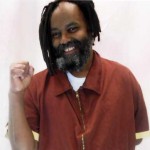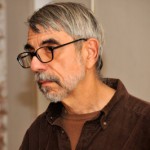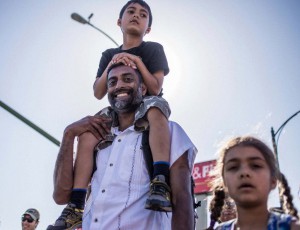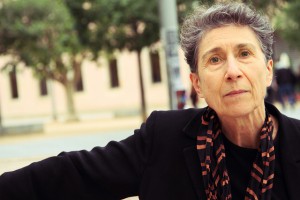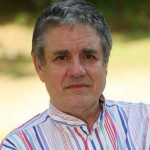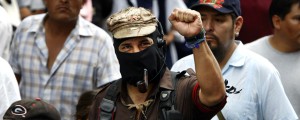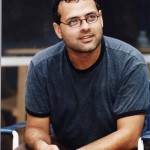2015 Session 7: Imperialism and Global Peoples’ Movements for Justice
Anne Braden Anti-Racist Training Program
2015: Session 7: Imperialism and Global Peoples’ Movements for Justice
Required Readings and Audio
- Arundhati Roy, “Come September” from War Talk. (14 page PDF of her original presentation: Roy Come September; or watch the video of her talk at youtube.com/watch?v=ET7I9jvP4Ic.) (bio).
- Mazen Masri, “No Backing Down on Palestinian Right of Return,” Left Turn April 2008. (On the Left Turn web site; also 3 page PDF: Masri No Backing Down Palestinian Right of Return). (bio).
- David McNally, excerpt from Chapter 5 “Debt, Discipline and Disposession,” Global Slump. (10 page PDF: McNally excerpt Global Slump). (bio).
- POWER, Towards Land Work and Power: charting a path of resistance to u.s. led imperialism, excerpts on “Imperialism” and “Neoliberalism”. (12 page PDF: POWER excerpt Towards Land Work and Power). (bio).
- Vijay Prashad, “Bread,” pages 9–14 of Arab Spring, (5 page PDF: Prashad Bread 2). (bio).
- Jean Stewart and Marta Russell, excerpt from “Disablement, Prison, and Historical Segregation,” Monthly Review, 2001, Volume 53, Issue 03 (July-August) (4 page PDF: Stewart Russell excerpt Disablement Prison). (Stewart bio). (Russell bio).
Recommended Readings and Audio
- Pat Sheehan, “The Irish Prisoner Hunger Strike: Interview with Pat Sheehan.” 20 minute video. Vimeo at vimeo.com/32296567. (Also 5 page PDF transcript: Sheehan Irish Prisoner Hunger Strike).
- George Caffentzis and Silvia Federici, “A Brief History of Resistance to Structural Adjustment” from Democratizing the Global Economy. (On the web at ThirdWorldTraveler.com; also 4 page PDF*: Brief History of Resistance to Structural Adjustment). (bio for Caffentzis; bio for Federici).
- Program Demand Group of the Labor/Community Strategy Center, excerpt from “Towards a Program of Resistance”. (3 page PDF: Program Demand Group Intro Toward a Program of Resistance [excerpts]). (bio).
- Letter from Subcomandante Marcos to Mumia Abu Jamal, April 24, 1999 from Our Word is Our Weapon: The Selected Writings of Subcomandante Insurgente Marcos. (On the web at zcommunications.org); also 4 page PDF: Letter To Mumia Abu-Jamal from Subcomandante Insurgente Marcos). (bio for Marcos; bio for Mumia).
- June Jordan, “Moving Toward Home” from Living Room: New Poems. (2 page PDF: Moving Towards Home, June Jordan). (bio).
- “Non-Aligned Movement” from Wikipedia.
- “Global Resistance, Africa to Palestine”, audio of Amilcar Cabral (bio), Nelson Mandela (bio), Chris Hani (bio), the South African national anthem, and June Jordan (bio), from Freedom Archives, Roots of Resistance (CD), audio at freedomarchives.org. (Audio).
Further Resources
- Arundhati Roy, “Come September” from War Talk. The video of her talk (transcript above under Required) on Youtube. (bio).
- Gopal Dayaneni speaking at Catalyst Project’s Global Resistance Panel, March 27, 2011. Fifteen minute video at youtube.com/watch?v=VIwbHAYKx0k. (Also 5 page PDF of transcript: Dayaneni Transcript). (bio).
- Arundhati Roy interview, “War Talk” on CNN. (bio).
- Elizabeth ‘Betita’ Martinez, ed., “Manifest Destiny or Imperialism?” from 500 Años del Pueblo Chicano / 500 Years of Chicano History. (1 page PDF: Martinez Manifest Destiny map). (bio).
- Stephen Howe, “Some Clarity … And Its Limits” from Empire: A Very Short Introduction. (3 page PDF: Howe Empire Some Clarity). (bio).
- Notes from Nowhere Collective, “Emergence: An Irresistible Global Uprising” from We Are Everywhere: The Irresistible Rise of Global Anticapitalism. (On NarcoNews.com; also 13 page PDF: Emergence: an uprising). (bio).
- South African Congress Alliance, The South African Freedom Charter. (On the web at www.anc.org.za; also 5 page PDF: South African Freedom Charter).
Readings are provided free for use by participants studying in the Anne Braden Training Program for Anti-Racist Organizers, a noncommercial, nonprofit educational program. We encourage everyone to buy the works from which excerpts have been taken – please support these authors and publishers.
Authors
Mumia Abu-Jamal is a Black writer and journalist, author of six books and hundreds of columns and articles, former member of the Black Panther Party and supporter of Philadelphia’s radical MOVE Organization, who has spent the last 30 years in prison, almost all in solitary confinement on Pennsylvania’s Death Row. His demand for a new trial and freedom is supported by heads of state from France to South Africa; by Nobel laureates Nelson Mandela, Toni Morrison, Desmond Tutu; by the European and Japanese parliaments and by city governments from San Francisco to Detroit to Paris; by distinguished human rights organizations like Amnesty International; by the Congressional Black Caucus and other members of the U.S. Congress; by the NAACP and labor unions; and by scholars, religious leaders, artists, scientists and countless thousands of others who cherish democracy, human rights and justice. In 1982 Mumia Abu-Jamal was sentenced to death for the murder of Philadelphia police officer Daniel Faulkner in a trial characterized by Amnesty International as filled with errors. For the next 30 years Mumia was held in isolation on Death Row. A federal judge ordered his death sentence overturned in 2001 and Mumia remains in prison under a sentence of life without parole. More at freemumia.com.
George Caffentzis is a professor in the Department of Philosophy, University of Southern Maine and a coordinator of the Committee for Academic Freedom in Africa. He is author of In Letters of Blood and Fire: Work, Machines, and Value, and with the Midnight Notes Collective of Midnight Oil: Work, Energy, War, 1973-1992 and Auroras of the Zapatistas: Local & Global Struggles of the Fourth World War.
Gopal Dayaneni “has been an activist for social, economic, environmental and racial justice since the late 1980s, working with such organizations as the Silicon Valley Toxics Coalition, the Design Action Collective, Project Underground, Media Alliance, and the Progressive Communicators Network. He currently serves on the Planning Committee for the Movement Generation Justice and Ecology Project, which works to bring a strategic understanding of the ecological crisis to racial and economic justice organizers. Gopal also serves on the board of the International Accountability Project and is a trainer for and board member of the Ruckus Society.” – Bioneers
Silvia Federici is an Italian feminist, co-founder of the Committee for Academic Freedom in Africa and the Radical Philosophy Association’s Anti-Death Penalty Project. She teaches International Studies and Political Philosophy at Hofstra University in New York. She is a leading autonomist Marxist scholar. Her masterwork, Caliban and the Witch, expands on study done with Leopoldina Fortunati, and builds off the work of Mariarosa Dalla Costa and Selma James of the Wages for Housework campaign. Federici lived for three years in Nigeria where a campaign of misogyny accompanying the attack on communal lands under the direction of the “structural adjustment plan” enabled her to understand the adjusting structures of European capitalism at its violent beginnings.
Chris Hani led alongside Nelson Mandela in the anti-apartheid movement, via the armed wing of the African National Congress (ANC), and he also served as leader of the South African Communist Party. He was known as a charismatic leader, with a following among youth, until he was assassinated in 1993. More at the Chris Hani Institute.
Steven Howe is professor in the department of historical studies at Bristol University. His most recent books are Empire: A Very Short Introduction, Ireland and Empire and Afrocentrism: Mythical Pasts and Imagined Homes.
June Jordan (1936–2002) was born in Harlem, the daughter of West Indian immigrant parents. As she recounts in her 1999 memoir, Soldier: A Poet’s Childhood, she passed her childhood years amid violence of many kinds. She began writing poetry very young, left home to attend a girls’ school in New England, attended Barnard College, was briefly married to a white man, had one son and a long & illustrious university teaching career. She died of breast cancer in Berkeley, California in 2002. At UC Berkeley she re-energized the teaching of poetry in founding Poetry for the People, a program which brings poetry reading and writing to life for students from all cultures and disciplines, fosters students’ passion for poetry and so inspires and empowers them to teach others. More at the Poetry Foundation.
George Katsiaficas in his own words: “I have been active in social movements since 1969 when I participated in the anti-Vietnam movement. A target of the FBI’s COINTELPRO program (Counterintelligence), I was honored to be classified ‘Priority 1 ADEX’ meaning in the event of a national emergency, people like me were to be immediately arrested. For 11 years, I worked in Ocean Beach, California … in a radical countercultural community that fought against war, police brutality, and rape as we built up a network of alternative institutions (free school, food store, bookstore/cultural center and others). After living in Berlin for 1 1/2 years and learning first-hand about the autonomous movement there, I wrote about that movement (The Subversion of Politics: European Autonomous Social Movements and the Decolonization of Everyday Life). For years, I was active for the cause of Palestinian rights. A graduate of MIT and UCSD (where I studied with Herbert Marcuse), I wrote … The Imagination of the New Left: A Global Analysis of 1968. I have been teaching at Wentworth Institute of Technology in Boston.” –ErosEffect.com
Labor Community/Strategy Center is a multiracial “think tank/act tank” committed to building democratic, internationalist, Left social movements and challenging the ideological, economic, and political domination of transnational capital. The Strategy Center’s work encompasses all aspects of urban life in the United States: it emphasizes class-conscious labor organizing and fighting for environmental justice and ending climate change, immigrant rights, and first-class transportation, as well as actively confronting the growing criminalization, racialization, and feminization of poverty.![]()
The Strategy Center synthesizes grassroots organizing – The Bus Riders Union and Community Rights projects – with education, policy development, and artistic culture production – Strategy Center Publications, The National Center for Transportation Strategies, the National School for Strategic Organizing, Voices from the Frontlines radio show, and AhoraNow periodical – to generate a creative and aggressive response to the growing power of the corporate-led political Right in the United States. The Strategy Center is committed to multilingual organizing, including the development of multilingual publications, productions, and visuals arts. They are located in Los Angeles, CA.
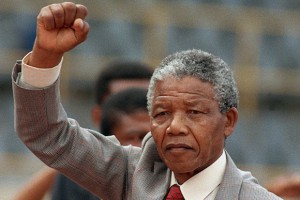
Nelson Mandela shortly after his release from prison in 1990. Photo: Trevor Samson/AFP/Getty Images.
Nelson Mandela (1918–2013) spent 27 years as a political prisoner for fighting against apartheid. He was a leader before his imprisonment, but his reputation continued to grow while he was behind bars for his commitment to liberation. After his 1990 release, he helped to lead the negotiations that led to representative democracy and the first multi-racial democratic election in South Africa, which resulted in his election as President of South Africa (where he remained through 1999).
Subcomandante Marcos is the spokesperson of Mexico’s Zapatista National Liberation Army (EZLN). In 1994 the Zapatistas (the name pays tribute to revolutionary hero Emiliano Zapata) led a rebellion in the Mexican state of Chiapas, fighting for the rights of indigenous peoples and opposing the global economic policies of the ruling Institutional Revolutionary Party (PRI) and the United States. The Zapatista uprising began the day NAFTA (the North American Free Trade Agreement) went into effect. Marcos and the Zapatistas have played a leading role in reuniting social movements around the world. The Zapatistas have developed and experimented with left organizing rooted in building popular democratic organizing in Chiapas and they have called on others around the world to come together and work against neo-liberalism and for humanity. Marcos has written over 200 essays and published over a dozen books.
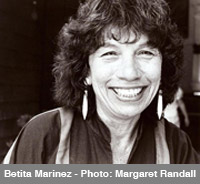 Elizabeth ‘Betita’ Martinez was one of two Latinas in the Student Non-Violent Coordinating Committee working to build grassroots power in working class Southern Black communities in the 1960s Civil Rights movement. She worked in New Mexico from 1968–1976 in the Chicano Power movement and edited a movement newspaper, El Grito del Norte.
Elizabeth ‘Betita’ Martinez was one of two Latinas in the Student Non-Violent Coordinating Committee working to build grassroots power in working class Southern Black communities in the 1960s Civil Rights movement. She worked in New Mexico from 1968–1976 in the Chicano Power movement and edited a movement newspaper, El Grito del Norte.
An antiracist, social justice activist for forty years, Elizabeth ‘Betita’ Martinez has published many articles and seven books on liberation struggles in Las Americas including 500 Years of Chicano History, and De Colores Means All of Us. Her most recent book, 500 Years of Chicana History has just been released. Martinez worked in the feminist movement and has prioritized alliance building between communities of color. In 1997 she co-founded the Institute for Multiracial Justice with former SNCC organizer Phil Hutchings. Martinez has been an advisor to the Catalyst Project since 2000. More info at The Rag Blog.
Mazen Masri is on the faculty of City Law School at the City University of London. Mazen is a qualified lawyer, a member of the Israeli Bar Association, and has served as legal advisor to the Negotiations Affairs Department of the Palestine Liberation Organization (PLO). He is a member of the academic committee of the Israel studies programme at Mada al-Carmel: The Arab Centre for Applied Social Research based in Haifa, and a member of the Steering Committee of Sijal Institute for Arabic Language and Culture in Amman. More at his faculty page.
David McNally “is a life‐long Marxist activist and scholar, … author of Political Economy and the Rise of Capitalism … Against the Market: Political Economy, Market Socialism and the Market Critique, Bodies of Meaning: Studies on Language, Labor and Liberation … Another World is Possible: Globalization and Anti‐ capitalism … Global Slump: The Economics and Politics of Crisis and Resistance [and] Monsters of the Market: Zombies, Vampires and Global Capitalism. He is a frequent contributor to Studies in Political Economy and Historical Materialism and to progressive, left magazines, including Against the Current, Canadian Dimension, International Socialist Review and the New Socialist.” – socialiststudies.com. He is on Facebook and maintains a web site at davidmcnally.org.
Notes from Nowhere Collective converged over a period of two and a half years to work on the We are Everywhere project. Here is how they describe themselves: “now that it is over we will disappear once again like an affinity group melting into a crowd. We are activists, editors, writers, teachers, and artists. All of us have deep connections to the movement for freedom, autonomy, life, dignity, and democracy. Some of us were involved in the shut-down of the WTO in Seattle, others have worked in movements of the global South, or were involved in London Reclaim the Streets; some are deeply rooted in their local struggles, others are nomadic organizers; some spend time teaching, others writing; some work with Indymedia, several are raising children, and somehow we manage to juggle all of these things. Living in different countries, on different continents, we remain connected by our irresistible optimism and our insatiable desire to turn the world upside down.” See the editors’ individual bios.
People’s Global Action is the name of a worldwide co-ordination of radical social movements, grassroots campaigns and direct actions in resistance to capitalism and for social and environmental justice. PGA is part of the anti-globalization movement. The initial inspiration for the formation of PGA came from a global meeting called in 1996 by the Zapatista Army of National Liberation (EZLN), which had started a grassroots uprising in the impoverished Mexican state of Chiapas on New Year’s Day 1994 when the North American Free Trade Agreement (NAFTA) came into effect.
POWER “is a membership organization made up of low-income African American and Latino workers and tenants in San Francisco. Through community and electoral organizing, leadership development and movement building, POWER brings a human face to important policy debates, transforms individual lives and brings about broad-based policy change at the city, state and national levels.” – peopleorganized.org. As of January 1, 2015 POWER has merged with Causa Justa :: Just Cause.
Vijay Prashad is the George and Martha Kellner Chair of South Asian History, Professor and Director of the International Studies Program at Trinity College, Hartford, CT. He is the author of a dozen books, including most recently The Darker Nations: A People’s History of the Third World. Two of his previous books were chosen by the Village Voice as books of the year (Karma of Brown Folk, Everybody Was Kung Fu Fighting: Afro-Asian Connections and the Myth of Cultural Purity). He is an editor or a contributing editor for Himal South Asia, Amerasia Journal, and Left History. He writes a regular column for Frontline, and occasionally for www.counterpunch.org. He is on the board of the Center for Third World Organizing (www.ctwo.org), United for a Fair Economy (www.faireconomy.org) and the National Priorities Project (www.nationalpriorities.org).
Arundhati Roy (b. 1961) is an Indian novelist, activist and a world citizen. She won the Booker Prize in 1997 for her first novel The God of Small Things. Roy was born in Shillong, Meghalaya to a Keralite Syrian Christian mother and a Bengali Hindu father, a tea planter by profession. She spent her childhood in Aymanam, in Kerala, schooling in Corpus Christi. She left Kerala for Delhi at age 16, and embarked on a homeless lifestyle, staying in a small hut with a tin roof within the walls of Delhi’s Feroz Shah Kotla and making a living selling empty bottles. She then proceeded to study architecture at the Delhi School of Architecture, where she met her first husband, the architect Gerard Da Cunha.
The God of Small Things is the only novel written by Roy. Since winning the Booker Prize, she has concentrated her writing on political issues. These include the Narmada Dam project, India’s Nuclear Weapons, corrupt power company Enron’s activities in India. She is a figurehead of the anti-globalization/alter-globalization movement and a vehement critic of neo-imperialism. In response to India’s testing of nuclear weapons in Pokhran, Rajasthan, Roy wrote The End of Imagination, a critique of the Indian government’s nuclear policies. It was published in her collection The Cost of Living, in which she also crusaded against India’s massive hydroelectric dam projects in the central and western states of Maharashtra, Madhya Pradesh and Gujarat. She has since devoted herself solely to nonfiction and politics, publishing two more collections of essays as well as working for social causes. In June 2005 she took part in the World Tribunal on Iraq.
Marta Russell (December 20, 1951 – December 15, 2013) “was an American writer and disability rights activist. Her book, Beyond Ramps: Disability at the End of the Social Contract … analyzes the relationship between disability, social Darwinism, and economic austerity under capitalism … In addition to writing for New Mobility and Monthly Review, Russell contributed articles to … journals such as the Journal of Disability Policy Studies and the Socialist Register as well as … newspapers.” – Wikipedia.
The South African National Anthem is a hybrid, including extracts of the hymn “Nkosi Sikelel’ iAfrika,” the former anthem “Die Stem van Suid-Afrika” (The Voice of South Africa), and new English lyrics. “Nkosi Sikelel’ iAfrika” was an 1897 church hymn that became known as a political song against apartheid, and “Die Stem van Suid-Afrika” is a poem that was set to music in the early 20th century and had been the national anthem from 1957 to 1995. In 1995, under Nelson Mandela, the South African government adopted both songs to be anthems, and then merged the two to form one anthem in 1997.
Jean Stewart is a writer and disability activist in the Bay Area. She is the author of The Body’s Memory and numerous short stories. She works with the disability activist organization CUIDO.
* Note: number of pages refers to pages within the PDF file to provide a sense of the download size, not the number of pages of readings included. Links to external web sites open in a new page.
Previous: Session 6: Social Change Organizing | List of Sessions
Next: Session 8: Deconstructing Class
About the Anne Braden Anti-Racist Training
Program for white social justice activists

